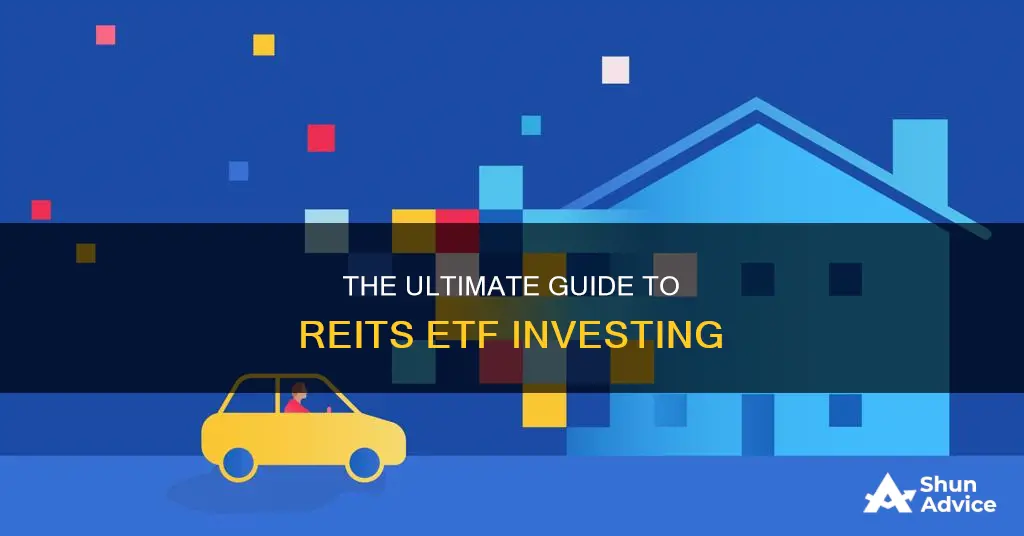
Real estate investment trusts (REITs) are a great way to invest in real estate without buying, managing or financing a physical property. They are popular among investors as they can diversify a portfolio, given their lower correlation to the performance of stocks and bonds. REITs are also less risky and highly liquid.
REIT ETFs, or exchange-traded funds, are an even more accessible way to invest in REITs. They are a convenient, cost-effective way to access the REIT market, offering investors broad exposure to the sector and reducing the risk of any single REIT underperforming.
Some of the most popular REIT ETFs on the market include the Vanguard Real Estate ETF, iShares U.S. Real Estate ETF, and the Real Estate Select Sector SPDR Fund.
When choosing a REIT ETF, it's important to consider factors such as dividend history, dividend yield, fund performance, expense ratios, top holdings, and assets under management.
| Characteristics | Values |
|---|---|
| Top REIT ETFs | Vanguard, Schwab, iShares, SPDR, Fidelity, Invesco, Pacer, VanEck, DoubleLine, First Trust, Hoya Capital, US Diversified, Global X |
| Average Annual Return Since Inception | 3.1% - 9.2% |
| Assets Under Management (AUM) | $64 million - $28.9 billion |
| Trailing 12-Month Yield | 3.0% - 9.2% |
| Dividend Yield | 2.3% - 3.9% |
| Expense Ratio | 0.07% - 0.59% |
| Number of Holdings | 30 - 150+ |
| Top Holdings | Prologis, American Tower, Digital Realty Trust, Equinix, Welltower, Annaly Capital Management |
What You'll Learn

How to choose the right REIT ETF for your financial goals
When choosing a Real Estate Investment Trust (REIT) Exchange-Traded Fund (ETF), it is important to consider your financial goals and objectives, research the various REIT funds available, outline your desired asset mix, and periodically review your investments. Here are some detailed guidelines to help you make an informed decision:
- Determine your financial goals: It is essential to align your investments with your financial objectives. For example, if you are approaching retirement, you may want to adopt a more conservative investment strategy. Let your financial goals be the guiding factor in your decision-making process.
- Research REIT funds: When evaluating different REIT ETFs, consider various factors such as dividend history, dividend yield, fund performance, expense ratios, top holdings, and assets under management. This information can be found in the fund's prospectus or on the fund's website. Understanding these factors will help you make a more informed decision about which REIT ETF best aligns with your investment strategy.
- Outline your asset mix: Before investing in a REIT ETF, assess your current investment portfolio and determine how you want to allocate your assets. Diversification is key to managing risk effectively. Consider how much of your overall portfolio you want to allocate to a REIT fund to achieve your desired level of diversification.
- Know what you own: Periodically reviewing and evaluating your investments is crucial. Stay updated with any changes in the market and the performance of your chosen REIT ETF. Leverage the resources provided by your broker, such as meetings with financial planners, to deepen your understanding of your investments. Remember that staying actively involved and informed is essential for making prudent investment decisions.
A Beginner's Guide to ETF Investing
You may want to see also

Understanding the different types of REITs: equity, mortgage and hybrid
Real estate investment trusts (REITs) are companies that own or finance income-producing real estate across a range of property sectors. They were created by Congress and signed into law by President Eisenhower in 1960 to encourage real estate development and give all investors access to the benefits of owning rental property.
There are three main types of REITs: equity REITs, mortgage REITs (mREITs), and hybrid REITs. Equity REITs are the most common type and they generate income by collecting rent on and selling properties they own for the long term. They are traded on major stock exchanges and provide investors with access to diverse portfolios of income-producing assets. Mortgage REITs, on the other hand, invest in mortgages or mortgage-backed securities tied to commercial and/or residential properties. They earn income from the interest on these investments. Hybrid REITs have direct ownership of real estate and also own mortgage paper.
Equity REITs may invest broadly or focus on a particular segment such as shopping centres, residential complexes, or healthcare facilities. They provide stable income and their revenue is easy to forecast as it is generated through rental payments. Mortgage REITs tend to perform better than equity REITs when interest rates are rising. They are vulnerable to changes in interest rates, however, as lower rates lead more borrowers to refinance or repay their mortgages, forcing the REIT to reinvest at a lower rate.
Both equity and mortgage REITs are required to pay out at least 90% of their income to shareholders as dividends. Equity REITs may be attractive to buy-and-hold investors seeking growth and income, while mortgage REITs may suit risk-tolerant investors seeking maximum income without a focus on capital appreciation.
ETFs and Unit Investment Trusts: What's the Difference?
You may want to see also

The benefits of investing in REIT ETFs
Diversification
Buying and holding REIT ETFs provides investors with a level of diversification that would be very difficult, if not impossible, to achieve by investing in individual REITs. A single REIT ETF can own anywhere from a dozen to several hundred REITs, covering all the different classes of real estate. This diversification helps to reduce individual investment risk.
Professional Management
Most REIT ETFs are managed by experts in the commercial real estate industry or are based on popular, broad-based REIT indexes. This professional management is especially valuable for retail investors who may not have the time or expertise to research the large universe of REITs on the market.
Cost-Effectiveness
Given the benefits they offer, REIT ETFs have a reasonable cost structure. They are also very convenient, as they trade on all the major stock exchanges just like shares of common stock.
High Dividend Income
REITs are required by law to distribute at least 90% of their taxable income to shareholders as dividends. This makes them a good source of dependable dividend income for investors.
Capital Appreciation
In addition to providing dividend income, REITs offer the potential for substantial capital appreciation over time. They have historically delivered strong performances versus the S&P 500 and have outperformed stocks over the long term.
Tax Advantages
Firms incorporated as REITs can avoid paying corporate income taxes if they distribute a minimum of 90% of their taxable income to investors. This allows them to distribute a substantially higher income to shareholders and avoid the double taxation experienced by most corporations.
Liquidity
REIT ETFs are highly liquid, making them less risky than investing in physical real estate. They are also less risky than investing in individual REITs, as they provide exposure to a broad range of REITs rather than a single company.
Invest Wisely: Precious Metals ETF Guide
You may want to see also

The drawbacks of investing in REIT ETFs
While investing in REIT ETFs can be a good idea, there are some drawbacks to be aware of. Here are some of the potential disadvantages of investing in REIT ETFs:
Expense ratios
While many REIT ETFs offer low expense ratios, some may have higher fees that eat into investment returns. For example, the iShares U.S. Real Estate ETF has an expense ratio of 0.40%, which is well above the industry average. Higher expense ratios can impact the overall performance of the ETF and reduce the dividend yield.
Liquidity
REIT ETFs, especially those that invest in non-traded or private REITs, may have lower liquidity compared to other investments. Non-traded and private REITs may have holding periods of several years, making it difficult for investors to exit their positions quickly.
Tax implications
Investors in REIT ETFs are required to pay taxes on the dividends they receive, unless the REITs are held in a tax-advantaged account such as an IRA. This can reduce the overall return on investment.
Limited control
When investing in REIT ETFs, individuals have limited control over the specific properties or mortgages that the REIT invests in. The investment decisions are made by the REIT management, and investors may not have a say in the day-to-day operations.
Risk of dividend cuts
While REITs are known for providing steady dividend income, there is always a risk of dividend cuts. This could be due to various factors such as a decline in the real estate market, changes in interest rates, or financial difficulties faced by the REIT.
A Beginner's Guide to Nasdaq ETF Investment
You may want to see also

How to buy a REIT ETF
A Real Estate Investment Trust (REIT) Exchange-Traded Fund (ETF) is an investment fund that focuses on the real estate market. REIT ETFs are passively managed and designed to mirror REIT indexes, such as the MSCI U.S. REIT Index and the Dow Jones U.S. REIT Index.
REIT ETFs offer investors a simple and affordable way to gain exposure to the real estate market. They are also a good source of income, as they are required by law to pay out 90% of their taxable income to investors annually.
You can buy a REIT ETF through a brokerage, such as Fidelity, in the same way that you would invest in a company stock. Here are the steps to follow:
- Open an investment account: You can open an investment account or brokerage account with a financial institution, which usually takes just a few minutes.
- Search for the REIT ETF: Use the broker's screener or browse through the available investment options to find the REIT ETF you want to invest in.
- Buy the REIT ETF: Once you have found the REIT ETF that meets your investment criteria, you can purchase it through your brokerage account.
- Consider diversification: Instead of investing in individual REIT stocks, you may want to consider investing in an ETF or mutual fund that invests in a range of REITs to achieve instant diversification and lower risk.
- Tax implications: Keep in mind the tax implications of investing in REITs. While REIT companies pay no taxes, their investors must pay taxes on any dividends received, unless the REIT investments are held in a tax-advantaged account, such as an IRA.
A Smart Guide to Investing in 3x ETFs
You may want to see also
Frequently asked questions
Real Estate Investment Trusts (REITs) are companies that invest in real estate or real estate-backed financial instruments. REIT ETFs are exchange-traded funds that invest in REITs, providing investors with diversified exposure to the real estate sector.
REIT ETFs offer several benefits, including:
- Attractive total returns and passive income: REITs have historically generated attractive total returns and provide a reliable stream of passive income through dividends.
- Liquidity: Publicly traded REIT ETFs are highly liquid, allowing investors to buy or sell during market hours.
- Diversification: REITs have lower correlations to stocks and bonds, making them a good tool for diversifying an investment portfolio.
When choosing a REIT ETF, consider the following:
- Financial goals: Ensure that your investment choices align with your financial objectives and risk tolerance.
- Research: Look into factors such as dividend history, yield, fund performance, expense ratios, top holdings, and assets under management.
- Asset allocation: Diversify your portfolio by outlining your desired asset mix before investing.
- Stay informed: Regularly review and monitor your investments to make informed decisions and consider seeking advice from financial professionals.







